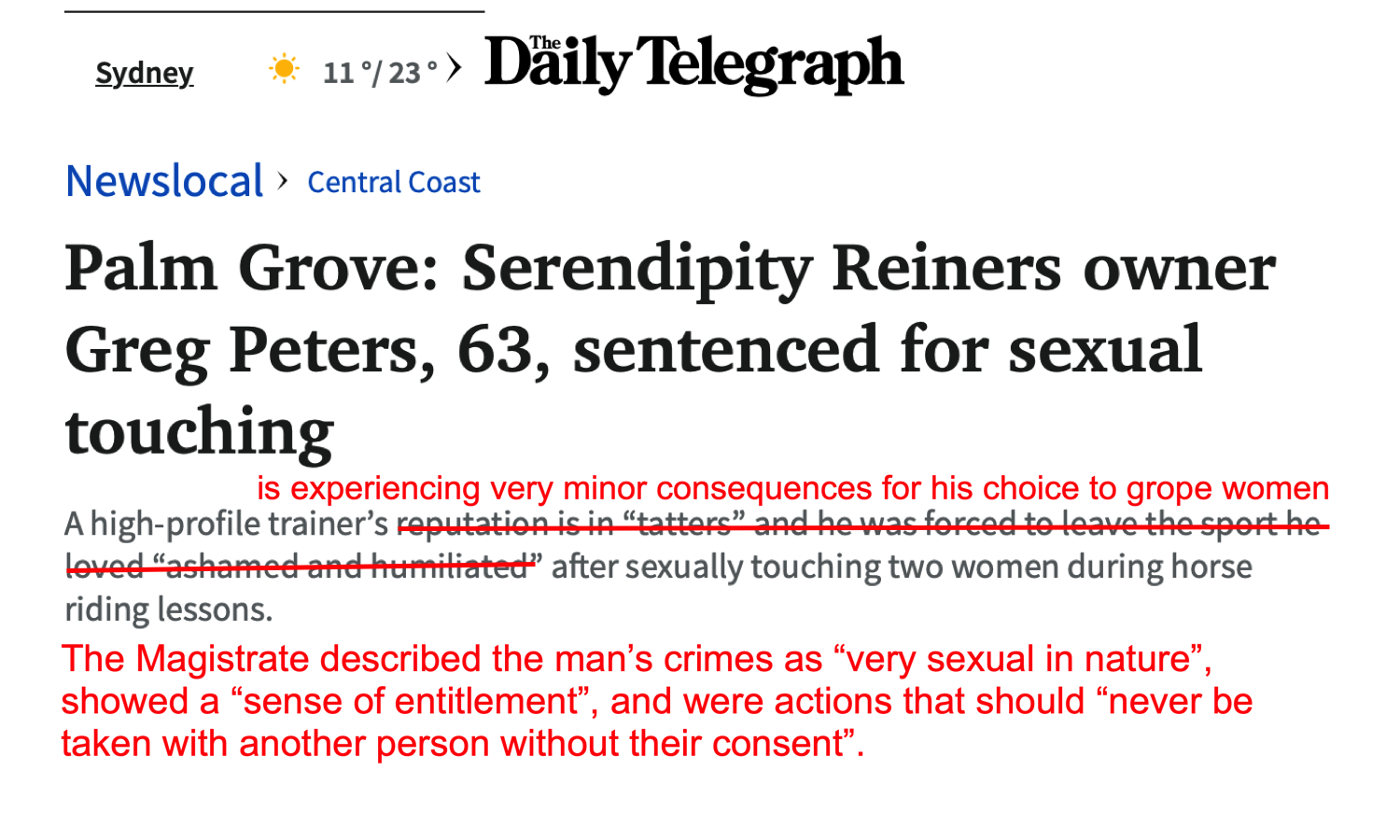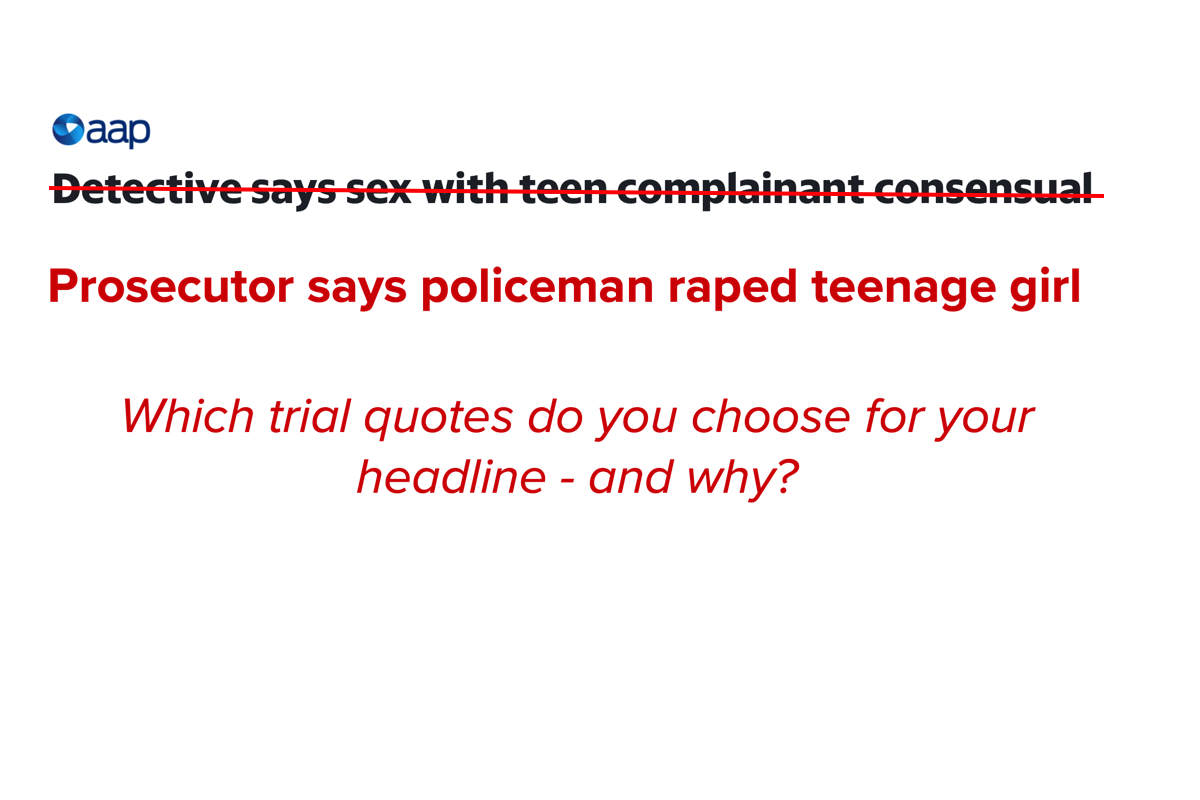The Daily Telegraph reported that 63-year-old Greg Peters pled guilty to sexually touching two women without their consent, with a sub-heading about how awful it is that he has to experience very minor consequences for his choice to grope two women who he was supposed to be instructing in an advanced form of horse riding.
The quotes in the lead paragraph were all taken – unattributed – from the defence lawyer’s statements and given no context. This is boringly common in reporting on men’s violence against women.
If you see a headline or summary paragraph full of sympathetic quotes about a man convicted of hurting women, it’s a safe bet the quotes come from the defence lawyer during the sentencing hearing. If the quotes are condemning the victim (‘woman accused of lying’ etc) it’s usually from the defence lawyer during cross-examination.
I’m not much worried about this single article by this one reporter. My concern is the cumulative effect of thousands of such articles across hundreds of publications, where most readers flick their eyes over the headline or (at most) skim the article. These readers don’t need to think deeply about the details and may not realise how their attitudes are shaped by the endless repetition of sympathy for men who hurt women and contempt for women who are hurt by men.
Those people vote. They serve on juries. They run businesses and sports clubs and libraries and pubs. They respond to friends or colleagues talking about men who hurt them. Their attitudes matter.
Journalists don’t have to be activists and certainly, court reporters shouldn’t try to be activists. But they should try to be accurate and informative. Ignoring the context of unattributed quotes is the very opposite of both these things.
So, to provide the context:
I think this was probably a sentencing hearing (the alleged court reporting doesn’t tell us, so it’s difficult to be sure).
Victims typically only give evidence if the facts are disputed (at a contested hearing). Peters pled guilty, so the victims don’t need to give evidence and there would be no quotes for the article.
Victims can, if they choose, give a Victim Impact Statement (VIS) at sentencing hearings, but they can also ask the court to suppress them (including any mention of the fact the VIS was given) so we can’t know whether the reporter ignored the VIS, was unable to report it, or there was no VIS.
The prosecution’s job at a sentencing hearing is to sum up the facts of the case, refer the court to relevant principles for sentencing, and present any prior criminal record.
Otherwise, most of the submissions in a sentencing hearing come from the guilty person’s lawyer. Their job is to persuade the magistrate or judge to be lenient. This is where they talk about remorse, give statements from character witnesses, talk about any hardship the guilty person has suffered and anything else they can submit as an argument for leniency. It is supposed to be a persuasive, subjective argument, not an objective factual statement.
Sometimes the prosecution will argue against leniency and may even present evidence, but they might also agree with a lenient sentence or stay silent. Again, we are dependent on the court reporter to tell us what happened.
In my view, this article was hastily written and relied on lazy reporting of sympathetic claims by the defence lawyer that would appeal to the Tele’s largely older and male audience. No-one is hoping to win a Walkley with this, I doubt they’d expect it to get much notice or last more than a day on the site. They’re probably right. But, as I said above, that doesn’t mean there are no consequences for their choices.
_
If you’re reading this on social media, links to all the articles are on the post on my website: www.JaneGilmore.com
FixedIt is an ongoing project to push back against the media’s constant erasure of violent men and blaming of innocent victims. If you would like to help fund it – even $5 a month makes a big difference – please consider becoming a Patron
1800 RESPECT
Sexual assault, domestic and family violence counselling and support.
24 hours a day, 7 days a week.
Ph: 1800 737 732
www.1800respect.org.au
Suicide Call Back Service
24 hours a day, 7 days a week.
Ph: 1300 659 467
www.suicidecallbackservice.org.au
Kids Helpline
24 hours a day, 7 days a week.
Phone: 1800 55 1800
www.kidshelp.com.au
Men’s Referral Service
Support for men who use violence and abuse.
7 days a week
Ph: 1300 766 491
https://ntv.org.au/get-help/





